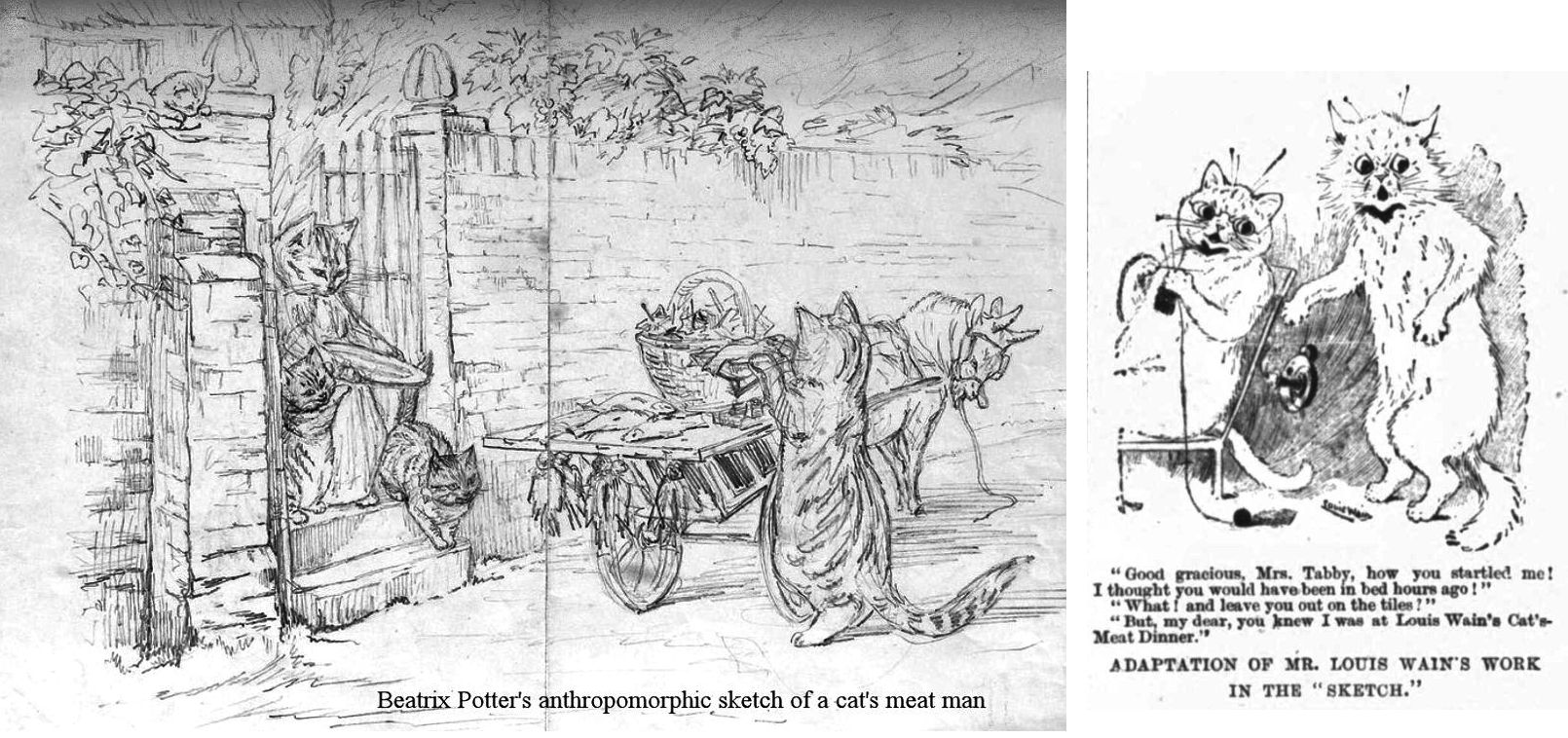
THE CAT'S MEAT MAN - IN SONG AND STORY
Cats' Meat Man
Cats' Meat Man in Song and Story (this page)
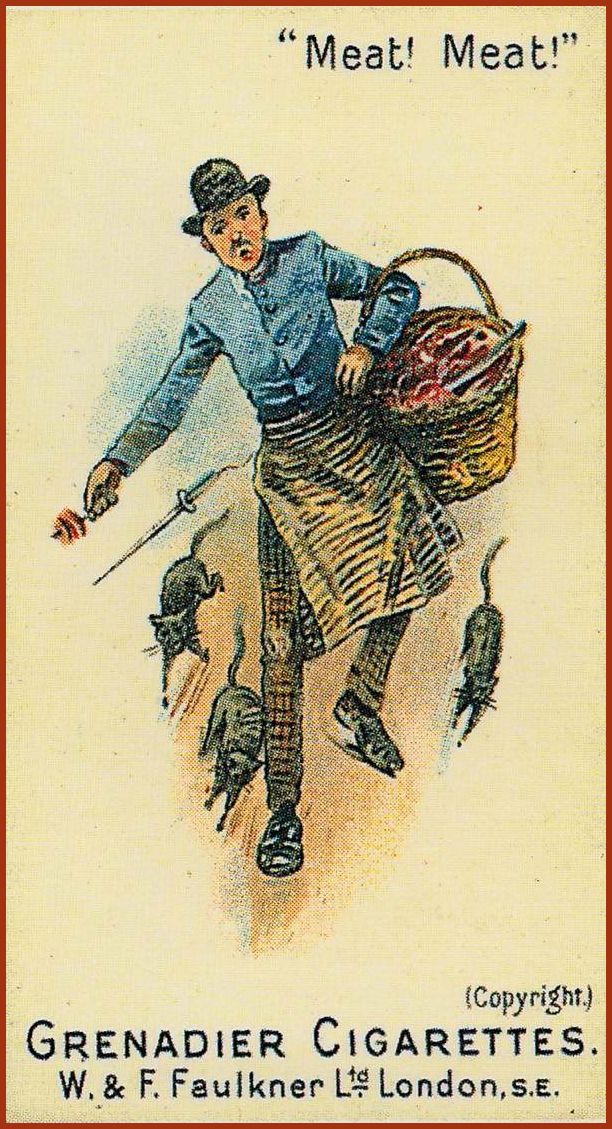
A common threat in the mid 1800s was "to make cats' meat of someone," for example "if you don't do as I tell you, I'll make cats' meat of you!" Another saying (1885) was "That's what I call self-evident preposition, as the cat's meat man remarked when the housemaid told him he worn't a gentleman."
One of the recurring characters in the Dr Doolittle sereies of books is Malcolm Mugg the cats' meat man who is a friend of John Doolittle. The Music Hall and Theatre Review (August 1906) mentions a duet called The Allisons who performed a well-received quarrelling duet between a cats'-meat man and his daughter who has just returned from boarding school and who is a little ashamed of what she terms "a purveyor of feline food." In 1908, a new drama put on by Mr Bustle in Buckinghamshire was called "Love on an Icerbeerg; or the Cats' Meat-man's Revenge." The Yorkshire Post and Leeds Intelligencer (18 May 1912) mentions Edith Lyttleton's play "Peter's Chance," set in a Mission house in Stepney, which features "Meatie, the cats' meat man, and a herd of tramps and thieves.
According to reviews, 'Mr. Charles Williams is a favourite here with his topical songs. His verse, however, about an old lady and the cat’s-meat man is now so ancient that it reminds us more of the way in which news travelled before the time of stage coaches, than of “a topic of the telegraph wire.” '(London and Provincial Entr'acte, 19 February 1876) (This verse is at the bottom of this article.) "Mr. Walter King tunefully relates the experiences of a “Cat’s-Meat Man,” and the trouble that is brought to him by a wife who has a weakness for pawning his belongings" (London and Provincial Entr'acte, 4th May 1895) and again, "Mr Walter King is comedian with real sense of humour, and his patter very funny. In the character of a cat’s-meat man lets his hearers into some of the secrets of the trade." (The Era, 13th September 1902)
‘Paynton Jacks, Gentleman,’ is one of those books which, although very slight, is distinctly amusing. Plot there is but little; we are introduced to old Josiah Jacks, an ex-cat’s-meat man, who wishes his son to be a gentleman and succeeds in his desire. The son then falls in love with a poor but well-born maiden, who for many years will have none of him, but finally capitulates in Kensington Gardens, and all ends well. The characters are all well drawn, and the authoress has succeeded admirably with her two fathers-the vulgar cat’s-meat man and the aristocratic squire; there is considerable humour, too, occasionally in the descriptions. (Guardian, 14th June 1893)
THE KING OF THE CATS’ MEAT MEN
This tale appeared in the Southern Reporter, 4th January 1872, and had been reprinted from the South London Press. At the time many common and humble trades were reputed to have kings, for example the king of the chimney sweeps.
The general public are perhaps not aware that there are kings of low as well as of high degree, and that we have many of them dwelling in our midst. A gentleman, whom we will call Mr Johns, happened to be entering one evening a well-known hall, to join a meeting of a certain committee of which he was a member, when he felt a tug at his watch chain. Looking around he observed a man running away. He glanced down and some his watch chain dangling with nothing at the end of it. The audacity of the affair astounded him, and for a moment he could scarcely realise the fact that he and his valuable gold watch had parted company. He started in pursuit, but soon found his way impeded by two or three vagabond-looking fellows who hustled him until the thief had got away, and them made themselves scarce. Finding that time had flown, he sought the good offices of a detective. But what could the officer of the law do? Mr Johns could neither give him a description of the thief not of the fellows who had hustled him.
The officer weighed the matter over in his mind a few moments, and then said: - "l can give you little hope, sir, of recovering your watch. Of course we'll do all we can; but the trick was done by a professional, and probably before this time the cases will have been battered up and sold to some old Jew dealer, who knows how to set his own price upon such things." Then a bright idea seemed to strike him: " Sir," said he, with a knowing wink, "there is just one hope. Go to the King of the Cats'-meat Men, get into his Majesty's good graces, then state your case. He is a host in himself, and will have a better chance of recovering your watch than all the detectives in London put together."
Mr J. thanked the detective, got from him the monarch's address, and at once hurried on his strange errand. He found his Majesty at home, asked him out to liquor up, and soon discovered that a right jovial monarch was he. When heard the story of the robbery he knitted his eyebrows, scowled, and gave utterance to an expression rather unbecoming a king. A moment's pause, and then—" Drink up," said he, “I'll put my nag in the trap, and we'll see what can be done."
In five minutes more Mr J. look his seat in the trap, and was driven off by the king, and in another five minutes they were travelling through innumerable dismal-looking back streets. Every now and then his Majesty pulled up at the top some dingy court, giving the reins to Mr J. while he prosecuted his inquiries. After visiting about a score of these dens of wretchedness and crime, his Majesty's efforts were crowned with success - one of his subjects "peached" upon a “pal," and the king returned to the trap with the joyful news. His Majesty then drove off with his guest to the residence of the thief as fast as the nag could carry them. These were moments of suspense; but soon the king pulled up at another those dingy courts. Leaping out of the trap his Majesty said, " You had better come with me, sir."
Mr J. felt some trepidation, but nerved himself to the task. Passing down the dark passage the king went direct to a house at the bottom of the court, and gave a loud knock at the door. Instantly there was a sound from within as of snuffling feet, then a murmur of hushed voices, and the door was opened, and his 'Majesty and Mr J entered a squalid-looking apartment. There were three men and two women there, all vile-looking characters; but when their eyes fell upon the king their countenances betrayed a scared expression. Looking straight at one of the desperate fellows, the king said in a commanding voice, “Give this gentleman his watch!”
The man addressed looked strangely, first at the king and then at Mr J, and began to protest tht he was as “hinnocent as the babby wot wasn’t born.”
“Give this gentleman his watch!” roared the king, “or I’ll send you back with your ticket-of-leave!”
“But – but -” began to blubber the ruffian. But he was stopped by the king, who again demanded the watch, being the third and final time of asking. The rascally fellow, fearful of exciting the wrath of the king, and trembling from head to foot, sneaked to a corner of the room, raised a board in the floor, brought forth the identical watch, and tendered it to its owner, with an apology – not for having stolen it, but for having damaged the ring, as he had just struck the first blow towards breaking it up when the knock at the door stopped his operations. He begged that the “gent” would not “peach to the coppers,” and having received this assurance, the thief held the candle at the door while his unwelcome visitors made their exit up the passage. The king landed Mr J in a main street, had another liquor up, refused on his dignity to take any compensation for his services, and drove away, no doubt with the consciousness that he had done god service. And so he had, and Mr Johns will no doubt remember to the longest day he lives his strange adventure with the “King of the Cats’ Meat Men.”

TOM PAUNCH, THE CAT'S MEAT MAN
From “Streetology of London; or, The metropolitan papers of the Itinerant club”, edited by Harcourt Brown (1837)
Our illustration of the cat's meat man is Tom Paunch, well known at Monk's the knacker's, near the London Hospital. Neither is he a stranger at the horse boilers of Haggerston, or Gray's Inn Lane, places notorious for the supply of cat's meat. Such is the immense demand for it, that men are employed to look about the streets of London, to buy up any poor animal that, from accident, or otherwise, may drop down dead; and such ,the competition, that they outbid each other for a good conditioned horse, in the proportion of £3 to £1, as was recently experienced at the Mansion House. However filthy the employment it is nevertheless profitable; a middling horse producing from £6 to £7. It may appear singular, but it is nevertheless true, that we never see the tongues of horses exposed for sale in the cat's meat barrows, nor could I find a cat's meat man who had ever bought one at the boiler's [renderer's]. It is said, that in Field Lane, Peter Street, Cow Cross Street, and other places, where they manufacture sausages, that they have tongues in them, which, if blessed with speech, would speak in most hoarse language.
Tom Paunch is a smart fellow, with his velveteen jacket, fustian trowsers, blue apron, and high-low shoes, blue bird's eye, and check shirt; a
natty cart, well filled every morning with a bit of the best, drawn along by his faithful "Tray," whose cocked up tail, fox head, and sleek black
skin, denotes that his inside is well supplied with the substantial. Tom is a great favourite with the kitchen maids, and frequently, while
cutting out a nice bit of horse for pussy, cookey is carving a bit of beef, veal, lamb, or mutton, for Master Tommy. He may be found every morning
in the week, about 10 or 11 o'clock, going up Holborn Hill, resting upon the tail of his cart, as our artist describes him, leaning forward with a
splendid penn'orth, cut upon a skewer, ready for delivery. At certain periods of the year, horse flesh is scarce, and the dogs' and cats' meat men
have to travel occasionally to all the knackers, before they can get a supply: their anxiety and that of their customers, for the expected cry of
" cat's meat," seems to speak as plainly as the hero of Bosworth Field, "A horse, a horse, my kingdom for a horse:" but it must be a dead horse,
for upon these emergencies they are obliged to search the butcher markets for the condemned meat, to satisfy the canine and feline cravings of
their customers. I shall finish the sketch of the fancy cat's meat man with a chaunt, that used to be sung by one of the knights of the skewer at
the Beggar's Opera.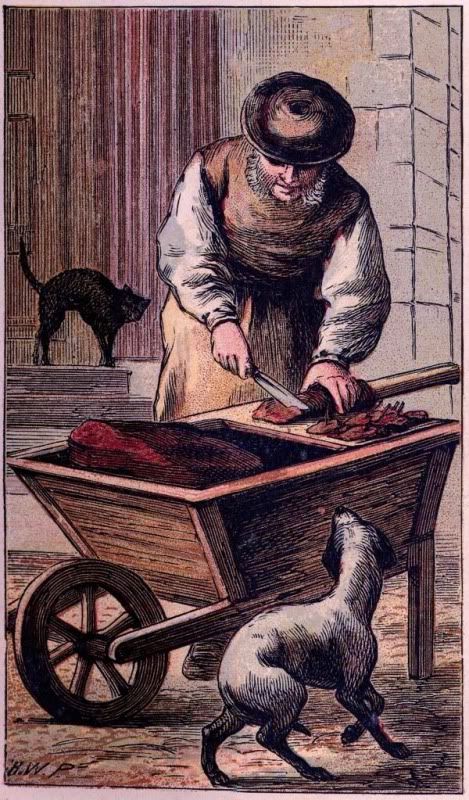
Vy need the ladies' cats to mew ven I'm in dog cart seated,
They know, as vell as me, as how with dog's meat they'll he treated.
I'm reg'ler as the postman round, to feed their mouse-traps daily
Fills my cart in Mile End Road, I empts out in the Old Bailey.
There aint another chap like me, I cuts such slashin slices,
And all the hanimals feeds, salutes me wi' their vices.
There's Jinny Grey, the grocer's cat, a reg'ler out and outer,
She'll have her weight, full half pound, for nothin less vill suit her.
Then there's an old maid's tabby Tom, she says, he's sich a rover,
He never takes the slice I cuts vithout blessin over.
There's some vont take the last cuts, because they're wery dainty.
And some vot turns there noses up, ven it's little tainty.
They aint no easy job to please, their appetites so wary
But then the best of meat I buys, no rubbish don't I carry.
I never buys a bit o' slink, nor any thing vot's stinkin,
But out and out prime pony meat, vat can sell like vinkin.
Cats' meat! dogs' meat cats' meat! I cry, Rose barks, and brings me custom
I drops the flesh, they drops the browns, cats' meat never trusts 'em.
[Browns = coins; slink might refer to cat carcases from cat-skinners]
The Illustrated London News (24th June 1882) mentions a contributors recollection of Berlioz’s "March Hongroise" being clouded by memories of the tune being used for a vulgar ditty called “The Cat’s Meat Man” which included the verse:
And she fell love with the Cat’s Meat Man,
The Cat’s Meat Man, The Cat's Meat Man;
And she fell in love with the Cat’s Meat Man,
The Man that sold the Meat."
A response to that writer said the jingle fitted the tune of the Radetzky March composed by Herr Joseph Strauss. Other correspondents identified the tune as “Caprice Hongrois,” and “Buffalo girls, will you come out tonight, and dance the light of the moon?” (Illustrated London News, 30th April 1887). This must have been a popular ditty as it was mentioned elsewhere a few years later: "I can remember the air of the [Austrian] march exactly by a kind of mnemonic process; for the late Watts Phillips, the dramatist (and an inveterate wag), used to declare that only one set of words would suit the march, and that these were : And she fell in love with the cat’s-meat man, The cat’s-meat man, the cat’s-meat man ; And she fell in love with the cat’s-meat man, The man that the meat It is just possible that some musician (with an “ear”) may recognise the melody from the rhythm of the above jingling doggrel" (Illustrated London News, 23rd April 1887).
|
|
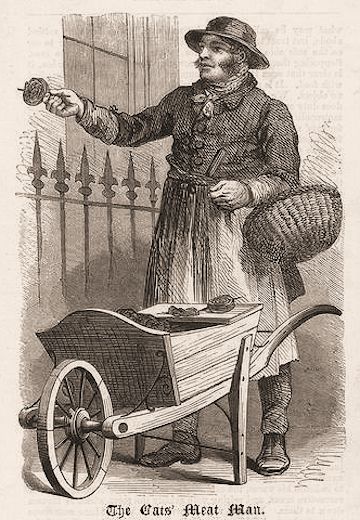 |
This illustration with its accompanying verse is from 1883 "The Cat's-Meat Man" and is a song celebrating this "Purveyor of Cat's Meat to Her Majesty" (the legend on the basket and barrow in the bottom right corner). Such ditties were written to be sung around the piano, back in the days when families made their own musical entertainment. It went:
He calls 'Meat, Meat!',
All down the street;
And dogs 'bow-wow,'
And cats 'mi-ow,'
While kittens sly
Come purring by,
As if to say -
'Do serve us, pray,
For we're so small.'
The man throws bits
Of meat to kits,
And cats and dogs;
Then on he jogs,
And down the street
Still cries 'Meat, meat!'
The ditties served like the chimes on modern ice cream vans. Another one went:
Cat's-meat, cat's-meat, - meat, I cry,
On a skewer - come and buy;
From Hyde Park Corner to Wapping Wall
All the year I 'Cat's meat' bawl;
Cat's-meat, cat's-meat, - meat, I cry,
On a skewer - come and buy.
(Originally sung in the mid 1800s to the tune of 'Cherry Ripe')
The Bystander (8th September 1926) refers to “A long series of doggerel ballads which were published in London in the thirties and forties of the nineteenth century, and sold in the streets. One of these, called “Lovely Emily; or, The Cats’-meat Man’s Daughter,” [. . .] She was incomparably lovely, so lovely that her father, an honest but ambitious seller of cats’ meat, declared she should only marry “a Dook or a Hearl.” The end of the story was the Emily, having lost her beauty in the course of a good many years’ rejection of eligible suitors, finally got married-
She didn’t marry a Dook or a Hearl, but something wuss-
The bow-legged conductor of a tuppenny ‘bus.
The moral of the ballad was extremely flattering for poor women. It set out that beauty was a snare and led to discontent and aspirations far above the station of so humble a person as a cats’ meat man’s daughter.” This song was later recycled as "Polly Perkins."
The Portsmouth Evening News (10th July 1936) mentions a song written by Mr. C. Welton, the proprietor of a well-known business in Fratton Road, Portsmouth, and resident at Southbourne, Emsworth. "The author of a capital comedy fox-trot which has just been published by a London firm. The song is entitled 'Tom the cats’ meat man.'” It has a catchy melody."
Sketches and songs based on tradesmen – dustmen (My Old Man’s a Dustman), rag-and-bone men (Any Old Iron?), etc - were common in the heyday of music hall and variety shows. The London and Provincial Entr'acte (5th July 1873) mentions Mr. J.W. Gordon’s Variety Show at Southampton “Another attraction is the well-written dialogue songs of Jolly Little George Lewis; his version of “Bradshaw’s New Railway Guide,” and The Cat’s Meat Man,” are effective.” The Stage (26 December 1890) tells us “The Two Bostons created much fun with their little dog, cat and performing elephant. One of the Bostons sang ‘Looking for the Cat's- meat Man,’ an amusing ditty, with most successful results.” The same publication (27 April 1922) describes a sketch called “The Horse Sale [which] opens with a lively ‘Horses’ number, smartly worked by Jack Charman; and we then have the pathetic incident of the sale of Bonnie Black Bess by a little boy and girl (John Humphries and Daisy James) to save ‘the old home.’ The auctioneer (Tom Fancourt) fails to obtain a bid, and the animal eventually passes to a cat's- meat man for half-a-crown.”
In 1845, a farce was produced, at the Olympic Theatre, London, entitled "The Railway King." At the time, there was great speculation on railways routes (many of which never came to fruition) and quite a bit of corruption by rivals presenting plans for various routes. In the play, Sam Stag, the Railway King, is the cats-meat man, who gives up his business to become a railway-director line. He gives the line from the North Pole to China and New York his name and influence, in order to get money from Sir Jacob Quailes, a baronet with an interest in railways. Sam Stag courts the baronet'sdaughter and also his cookmaid, Sal Slop, who, on discovering his affection for her mistress, threatens to do something desperate, but is eventually wheedled into forgiveness. The cats-meat man/railway-director is betrayed to the baronet by a rival and is unmasked as a love-cheat when found with Sal Slop. Sir Jacob Quailes sends for the police, and Sam Stag is transported to Van Diemen's Land for cheating the baronet. The moral of the farce (in addition to that of the rife corruption among railway speculators) is about having ideas above one's station. (London Evening Standard, 4th November 1845)
Not all theatrical references to the cats' meat man were deliberate. Miss Grey, an actress with a keen sense of appreciation for the ridiculous, related the following anecdote. A lady friend of hers was very fond of cats and always had at least two of the sleek coated quadrupeds with her at the theatre. One night, in the course of some play, this lady was on the stage in an exciting situation and she had occasion to shriek out “Lights, lights!" Hearing the familiar cry, and evidently eagerly envisaging the offerings of the cats'-meat man, the two cats bounced out upon the stage mewing quite pathetically. Their sudden appearance rather undermined the dignity of the tragedy that was being performed because the audience immediately understood what had excted the cats and was convulsed with laughter. (South Wales Echo, 23rd July 1886)
In the 1890s, the advent of the phonograph meant that the cries of familiar street traders could be recorded for posterity. The Pall Mall Gazette (9th October 1891) described this in “THE COSTER AND THE CATS’ MEAT MAN PHONOGRAPHED. Some of the cries of London have been confided to the phonograph and will be added to that wonderful library of voices which has been acquired by means of Edison’s perfected talking-machine. The records were taken at Edison house, Northumberland-avenue and present a medley of sounds familiar in the metropolis in this year of grace. A general dealer from Drury-lane, a cats’ meat man, dustman, sweep, milkman, a costermonger from the purlieus of Bedford Barracks, and a bus conductor all record for posterity the manner of crying their respective vocations.”
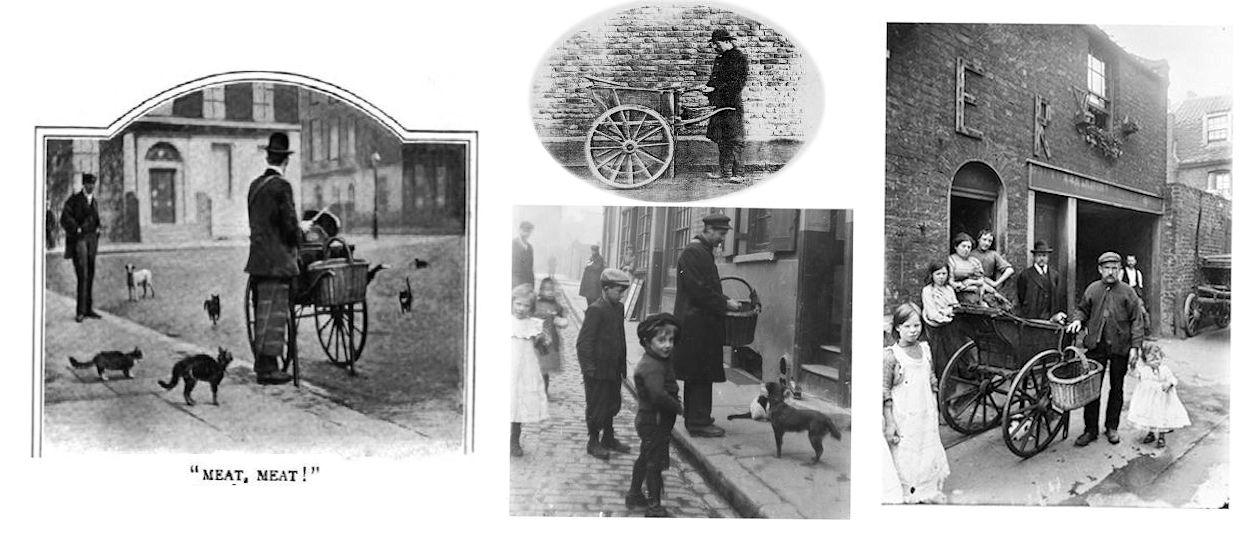
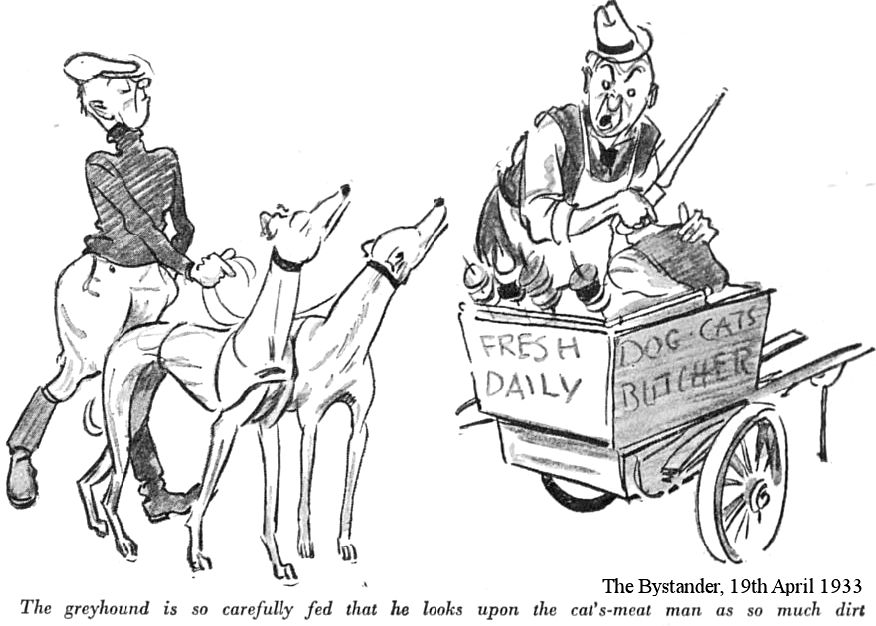
A PLAY ABOUT A CATS' MEAT MAN AND A FEW MORE MUSIC HALL SONGS
“IN SUNNY SPAIN; or THE TROUBLES OF A TOURIST.”
A Terpsichorean Extravaganza in Three Scenes, Invented and arranged by Jno. R. Huddlestone and Jno. Tiller. Libretto and Lyrics by Geo R. Sims and Chas. Frletcher. Music by herman Finck. Produced at the Winter gardens, Blackpool, in July 1906, and at the Hackney Empire in January 1908. This summary is derived from The Era – 14th July 1906 and 11th January, 1908
Bill Hopkins, a retired cat's-meat man and greengrocer, with his wife and child, are making a tour of Bolero. The late Lord of Bolero has died in debt and a lottery is being held, the first prize being the town and lands round Bolero, together with the hand in marriage of the Lord’s daughter, Dolores. Dolores, however is infatuated with Don Alfonso, who swears to prevent anyone but himself from marrying her. Hopkins has advanced a sum of money to an adventurer named Don Jose. Don Jose had previously left Spain for some shady reason and had become “pally” with Hopkins in England. With the loan, Don Jose buys three-quarters of the tickets, his main aim being to win Dolores. In return for the loan, Don Jose promises to make Hopkins a Count and give him a concession for Spanish onions. The lottery is drawn, and owing to mistake in the numbers Don Jose is supposed to have won. Alfonso, when he hears this, conspires with the villagers generally to recognise Hopkins as Jose and vice versa. Don Jose is held prisoner under the name of Bill Hopkins. Hopkins, after being threatened with death if he objects, accepts the situation, and discards his wife and child. In the second scene, set in a camp, Bill Hopkins, now the Lord of Bolero, must act as judge in an action which his former wife, Polly, brings against Don Jose, her pretended husband, for restitution of conjugal rights. The third and final scene is set in the Plaza del Toros. The conditions of the lottery state that the winner must take part in a bull-fight, so the fake don (Hopkins), in trepidation, takes lessons in bull-fighting. He escapes the real contest when it turns out that the number of the winning ticket had been read upside down. The correct winning ticket is held by Don Alfonso. At Hackney, Bill Hopkins was played by comedian Will Lytton and Polly Hopkins was played in the style of a panto dame by a man (but by a woman at the Blackpool performance where Don Alfonso is played by a woman).
|
DAN, THE CATS' MEAT MAN Down in our locality they call me Dan, everybody knows me as the cats' meat man. Chorus: Liza Brown's a girl that's very fond of me, once when I was sitting down with her to tea, All the cats I serve are always wearing smiles, always advertising me upon the tiles. Little Polly Pickle, living down our way, keeps a butcher-shop, she does, and yesterday THE CAT'S-MEAT MAN. Oh! love, it is a ticklish thing, it makes true lovers blue, Chorus. By trade I am a sandwich man, that is, I carry boards, I never had cause to doubt her, until I used to see She thought by marrying the cat's-meat man to lead a happy life; I swore I'd have satisfaction, I'll bring him to the ground; Last Chorus. THE CAT'S-MEAT MAN AND THE FIVE POUNDS. During the First World War, the St. Loe Stracheys turned their country home at Newlands Corner, Surrey, into a hospital for wounded soldiers. In her book, Mrs Strachey gave this well-known ditty: “If I’d a five-pound note,” said the cat's meat man. SAYS THE CAT'S-MEAT MAN. “Times has changed,” says the cats-meaat man; CAT’S MEAT by “Straws” (The Times Picayune, 24th October 1840) A nasty, dirty, drizzle, ev’rything is sloppy, slippery, Here’s somethin’ interestin’ tho’, a hack horse just deceased, Mea! meat! Lord, what a horrid thing is the digestive organ! It’s rainin’ now, the hacks and cabs and busses, by are rollin’; I never mean to touch a bit of meat again — what’s that? As I’m alive, there stops a cart in front of the next door; The nasty thing, I thinks I sees her pots, and her back kitchen; Hark! one, two, three, four, five o’clock, rings the old bell of “Bow;” Lord, what an ev’nin! who the deuce such weather wants to live in! |
(THE OLD MAID WHO) FELL IN LOVE WITH A CATS’-MEAT MAN. Near the old Flea-market not long ago, Says she, How I love you, you cats’- meat man, - Now every morning as he comes by, Then the cats all ran out at the cats’- meat man, The times are very hard, says the cats’- meat man, Why, had I but the money, said the cats’- meat man, The very next Sunday he was seen, She'd biscuits and ale wid the cats’- meat man, She'd biscuit and ale with the cats’- meat man, Then away she went home, and at the back door Then she went in all bathed in tears, Oh! you nasty dirty little cats’- meat man OUR OLD TOM CAT. According to the Atchison Daily Patriot (30th July, 1887), The Inter-Ocean (a Chicago newspaper) interviewed a cat’s meat man from Bethnal Green. After the interview, the young man took his interviewer to a local music hall at which the following was sung to the tune of “Ivy Green.” A downy old cove is our old tom cat, Chorus: Creeping over the tiles so pat, Old joints have fled, and the bones decayed, Fast he flies though he has no wings, |
You are visitor number